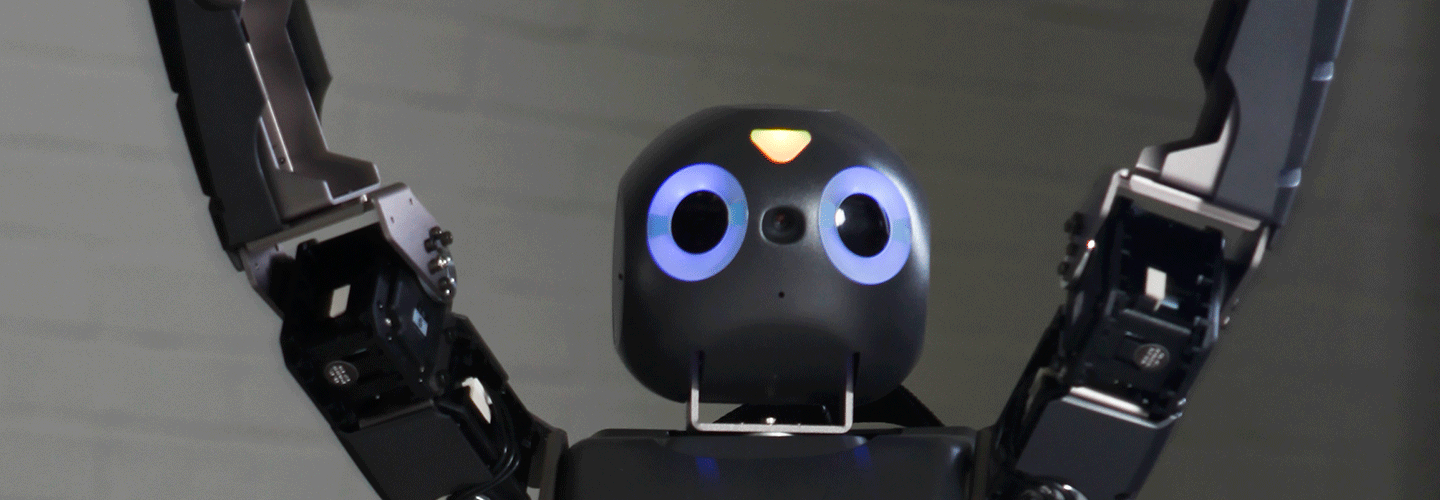RoboCup
Our Bold Hearts robot footballers are one of the most successful teams in the UK. Sharing the excitement of technology and science with a global audience, their triumphs on the pitch are also contributing to real-world developments in robotics and artificial intelligence.
RoboCup is the World Cup of robot football, an international robotics competition in which robots of all kinds – humanoid, box-shaped or virtual – play matches against each other. Capable of tackling, shooting, passing and – in the case of the humanoid – picking themselves up when they fall over, the autonomous robot players are fully controlled by on-board computers and make all decisions during the game entirely on their own.
The annual competition began in 1997, the same year that IBM’s Deep Blue chess-playing computer defeated Gary Kasparov, the human world chess champion. Designed to drive innovation in robotics, RoboCup’s official long-term grand goal is to create a team of humanoid robot footballers which, by 2050, will be able to take on the human football world champions – and win.
The University’s pioneering School of Engineering, Technology and Computer Science is an enthusiastic and committed RoboCup supporter. Our Bold Hearts team, the longest continuously active RoboCup team in the UK, was started in 2002 by Dr Daniel Polani, Professor of Artificial Intelligence and current President of the RoboCup Federation.
Bold Hearts has been highly successful, reaching the quarter finals of the 2017 RoboCup World Championship in Japan, coming second in the world in 2009 in Austria, and again in 2014 in Brazil. With RoboCup widely covered in the international media, our robot players are watched by thousands as they compete against teams from the more than 40 countries who take part each year.
“At the university we are fascinated by the AI challenges that football poses: how to make a machine understand what to do in a diverse sport such as football, without painstakingly setting out all possible scenarios under which it needs to operate… this feeds directly into our research and our research feeds back into our RoboCup team.”
Testing ground
The RoboCup rules are constantly changing to become more challenging. By switching the ball colour, changing the goal width or making the AstroTurf thicker, the computer science students who make up our Bold Hearts team are pushed to make their robot players ever more complex and capable, so they can cope with an increasingly difficult playing environment.
This is key to the broader goals of the RoboCup challenge. With artificial intelligence and cognitive technology becoming an ever-increasing part of our daily lives, football provides the ideal testing ground for developing robots that can interact and negotiate our complex world, in real time.
The automation technologies involved in making a robot footballer understand what to do in a changing environment - without having to set out all the possible scenarios under which it needs to operate - are the same as those being used to develop autonomous vehicles, or in manufacturing, or the intelligent robots that will interact with humans in the smart cities of the future.
With 2050 still decades away, the Bold Hearts members continue to demonstrate their robot players’ skills at open days and robotics exhibitions, helping to inspire an interest in STEM subjects – science, technology, engineering and maths – in the next generation of roboticists and researchers.
The team have given a demo at the Design Museum and more recently were put through their paces at a major exhibition on humanoid robots in London’s Science Museum. They are now limbering up for the 2019 RoboCup challenge in Sydney, Australia, working to enhance their robot platform ‘BoldBot’ and strengthen the self-printed parts of the newly developed robot.
In the meantime, there’s still only one Lionel Messi.
Professor Daniel Polani
Daniel's interest lies in understanding and imitating the processes that allow animals and humans to take flexible decisions in a complex and difficult environment, and enable them to adapt to different conditions gracefully. He aims to find out if we can do so incorporating learning ability, without compromising generalization ability and without hand-coding all necessary rules into a system. Daniel also wants to examine if there are general principles underlying intelligent information processing in living beings which we can exploit without having to resort to specialized solutions that vary from task to task.
For this purpose, his work employs methods from Artificial Life, and especially Information Theory, and applies them to Sensor Evolution, Collective and Complex Systems.

